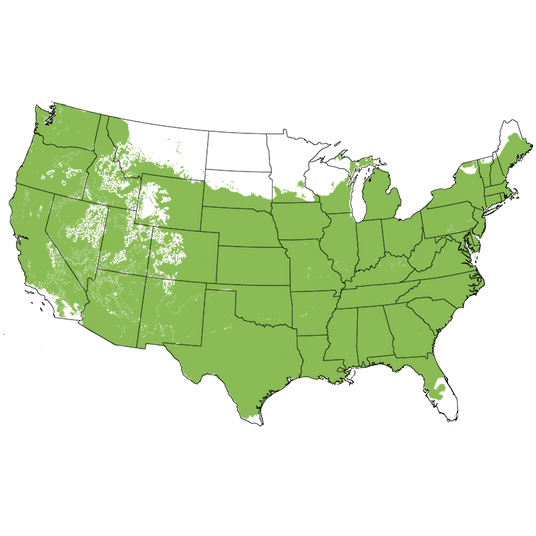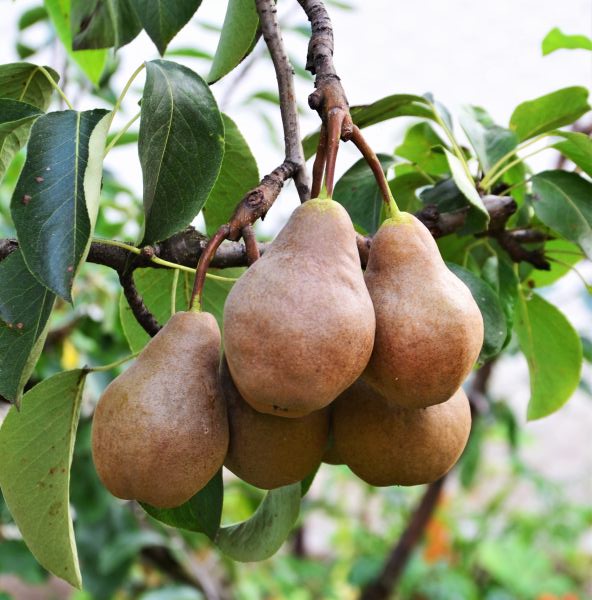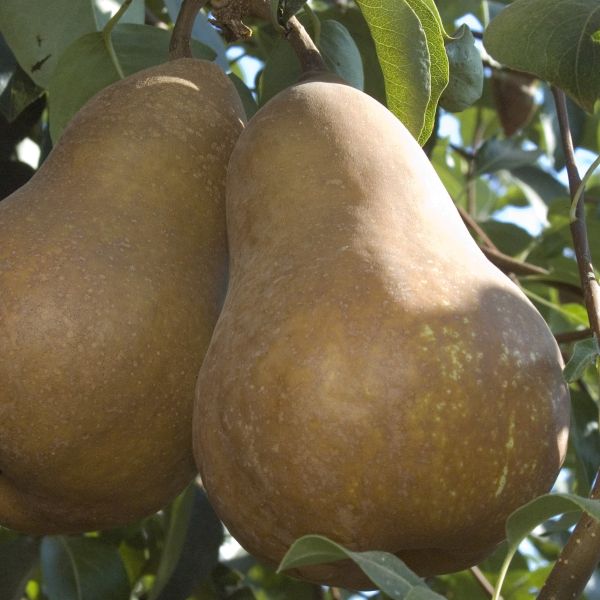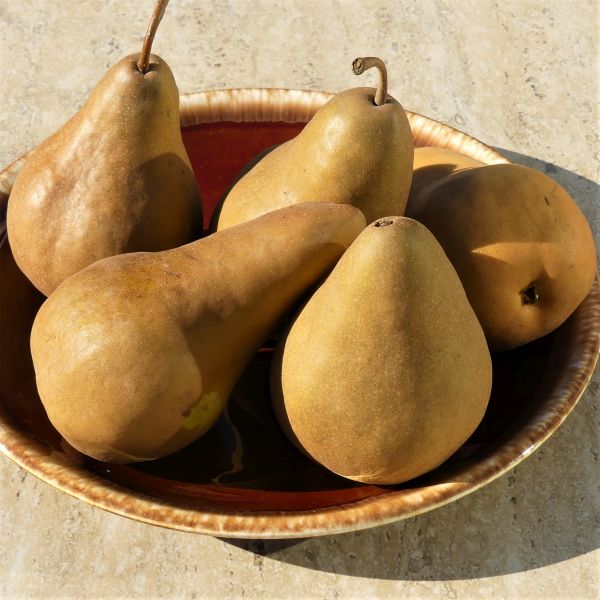Bosc Pear Tree
Pyrus 'Bosc'
Delivery and Shipping
Delivery and Shipping
Preorder Shipping Schedule
We ship your plants when it's safe to transport them to your zone. Dates are estimated and subject to weather delays.
| Zone 3-4 | Week of March 30th |
| Zone 5 | Week of March 16th |
| Zone 6 | Week of March 2nd |
| Zone 7-12 | Week of February 23rd |
Shipping Rates
Ships in 3-4 business days • Tracking provided • Weather protected
| Under $50 | $9.99 |
| $50 - $99.99 | $14.99 |
| $100 - $149.99 | $16.99 |
| $150 - $198.99 | $24.99 |
| $199+ | FREE |
✓ Zone-specific timing • ✓ Professional packaging • ✓ Health guarantee

Plant Sentry™ Protected
Your order is protected by our compliance system that:
- Prevents restricted plants from shipping to your state
- Ensures plants meet your state's agricultural requirements
- Protects gardens from invasive pests and diseases
Exceptional Flavor & Satisfying Crunch Bosc Pear Tree!
- Long Tapered Fruit & Russet Skin
- Crisp & Juicy White Firm Dense Flesh
- Delicious Sweet & Spiced Flavor
- Baking, Drying, Fresh Eating & Preserves
- Gorgeous White Blossoms
- Draws Pollinators
- Vibrant Green Foliage
- Adaptable & Low Care
- Late-Season Producing ‘Winter Pear’
- Highly Ornamental
- Smaller-Size & Oval Shape
- Pollinates With: Anjou, Bartlett, Comice & Seckel
- 500-600 Chill Hours
For a late-season pear addition to your orchard, look no further than Bosc Pear Tree (Pyrus 'Bosc')! This fragrant, smaller tree yields excellent fruit later in the season, making it perfect to plant among other pear varieties to extend your harvest.
The mid-spring display of sweet white blossoms smothers this tree and draws pollinators galore. Filling out with handsome vibrant-green foliage, these are highly ornamental in their own right.
This one-of-a-kind pear provides exceptionally delicious flavor! With a long, tapered neck and dark russet skin, the large fruit has a golden tinge to the surface of the skin. Looking delectable dangling from the upright, oval form.
Its crunchy, crispy, juicy flesh is a late-harvest treat, and the unique, strong spice, sweet flavor develops early. Often referred to as a Winter Pear, enjoy ripen Bosc Pears right off the tree!
Try this method for checking Bosc for ripeness, check the neck by pressing gently with your thumb for a slight give. Or ripen this variety by leaving it out at room temperature.
You won't wait long before your first bushels of healthy pears, because Bosc fruits in just 3 - 5 years. Keep in mind Bosc requires a pollinator, so choose another variety such as Anjou, Bartlett, Comice or Seckel.
How to Use Bosc Pear Tree In The Landscape
Plant in the backyard or a side yard to enjoy its colorful springtime show of flowers. The lovely display of ripening pears brightens up your landscape!
The white spring flowers combined with fantastic summer foliage create a fantastic specimen tree for front landscaping. Why settle for a Flowering Pear, when you can also reap the benefits of a fruiting tree as well?
Dual-purpose and Edible landscaping are quite popular, so get a head start by using multi-use plants! The size makes it easy to plant Bosc and its pollinator, but if tight on room, try this high-density planting trick!
Fantastic shade plants for patio or seating areas, you’ll be within arms reach of gorgeous blooms and luscious fruit while reading or relaxing in the cooling shade. Bosc Pear is also a great addition to a healthy diet. It is a good source of vitamin C and is loaded with dietary fiber.
The flesh of this pear is firm and is a cook's choice for baking and dessert-making, greater so than other pears. Bake it whole, drizzled in glaze, or make a pear crisp that's out of this world. Great fresh, slice into green salads or a perfect complement to gourmet cheese plates.
ProPlantTips For Care
Fruit trees require full sun for the most vigorous growth and best harvest. Provide at least 6 hours of sunlight per day, favoring the drying power of the morning sun. Hardy in USDA growing zones 4-9, you can be assured this is a cold and heat tolerant, easy-care tree!
Best in enriched, organic sites with well-drained soil. Preferring consistent and moderate moisture, so protect your investment from drought with supplemental watering. Provide ample water for your young tree while it’s establishing, not allowing it to dry out between waterings.
For best results, fertilize your tree regularly with Dr. Earth Fruit Tree Fertilizer. Add Nature Hills Root Booster while planting for a life-long symbiotic relationship with the tiny feeder roots.
Prune to keep an open canopy so that both sunlight and airflow reach the interior. Head over to our Garden Blog for more Fruit Tree Planting, Fruit Tree Pruning and Fruit Tree Care tips and tricks can be found!
The Bosc Pear Tree is a favorite among pear lovers and has been for years, and why it is one of the world's most popular pears! Order at NatureHills.com!
Bosc Pear Tree Frequently Asked Questions
How long does it take for Bosc Pear Trees to bear fruit?
Nature Hills Nursery sells fruit trees with mature root systems, and will often set fruit in their second or third years.
How Fast Do Bosc Pear Trees Grow?
Pear trees are moderate growth rate plants and can add 12-18 inches and more per year in optimal conditions once they have established.
Where do Bosc Pear Trees Grow Best?
Pear trees grow best in well-drained, fertile soil in at least 6 hours of full sun per day or more.
Do You Need 2 Pear Trees to Produce Fruit?
All Pyrus varieties have different requirements to set fruit. While a few varieties are self-fertile but will always have a larger harvest with a pollination partner. Bosc (Pyrus 'Bosc') is not self-fruiting and needs a pollinating partner. Pair with one of these varieties:
No room? Look into High-Density Planting techniques, or choose a semi-dwarf or dwarf fruit tree.
When Should Bosc Pear Trees be Planted?
Bareroot Pear trees are best planted in the spring but container-grown Pear trees can be successfully transplanted all throughout the growing season as long as the ground isn’t frozen and they are carefully watered as needed. Check for first and last frost dates for your area with your local County Extension Office.
Harvest Times for Bosc Pears
Bosc pears are typically ready to harvest in September.
How Do I Find Bosc Pear Trees for Sale Near Me?
Make your life easier and your yard happier by shopping for Pear trees at NatureHills.com online fruit tree nursery. You’ll find a massive selection of fruit trees for sale, including many lovely Pear tree varieties!
Choose the right tree for your area by first finding your growing zone by entering your zip code in the field above the Plant Highlights section on our product pages. Narrow down your options by plant hardiness zone, sun availability, and size requirements.
Place your order, knowing it’s backed by the Nature Hills Nursery product guarantee and protected by Plant Sentry™, which helps ensure regulated plant materials aren’t sent to prohibited areas.
Expect to receive your plants at the appropriate planting time for your growing zone when temperatures are safest.
What shipping options do you offer?
NatureHills.com works closely with our growers and nursery professionals to ensure we ship when it is most appropriate for your area. Our goal is to deliver the hardiest plants by avoiding extreme high and low temperatures. Check out our shipping schedule for more information and to learn our wills and won’ts when it comes to shipping plants. Find your Bosc Pear Tree for sale here at NatureHills.com!
-
Botanical Name
-
Growing Zones
-
Height
-
Width
-
Sunlight
-
Growth RateModerate
-
Flower Color
-
Leaf Color
-
FragrantYes
-
Bloom PeriodLate Spring
-
Does Not Ship ToAK, HI, ID, MT







